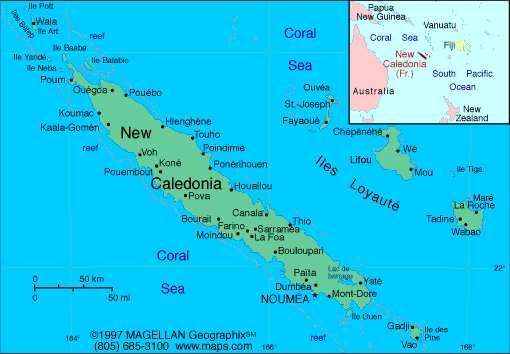New Caledonia
NEW CALEDONIA IS A French protectorate located in southwestern Oceania, approximately equidistant from AUSTRALIA, NEW ZEALAND, and FIJI. It consists of the principal island, Grande Terre, as well as the outlying Loyalty Islands and their nearby atolls and reefs. Archaeological evidence suggests human settlement dates from approximately 4000 B.C.E. Distinct forms of pottery and imported obsidian objects found in New Caledonia indicate that its early human inhabitants had conquered long-distance ocean travel, and the islanders were part of a broad seafaring civilization prominent in MELANESIA and western Polynesia between 3000 and 3500 B.C.E.
The climate is tropical, with heat and humidity modified by southeasterly trade winds and seasonal typhoons. The terrain of Grande Terre is characterized by sandy coastal plains with rugged interior mountains. These heavily forested peaks cover some 40 percent of the country's land area. The country hosts more than 3,000 indigenous plant species, many of which are seen as potential sources for new pharmaceuticals. Its tropical rainforest is one of the most botanically diverse in the world. There are also some 4,300 fauna species, including unique birds and freshwater fish as well as bats, pigs, and lizards.

The population has traditionally been concentrated along the coast. The ethnically Polynesian and Melanesian population first came into sustained contact with Westerners when French Catholic missionaries arrived in 1843. FRANCE established its sovereignty over New Caledonia in 1853. The capital city, Port de France, changed its name to Noumea in 1866. Plans for establishing a French penal colony, similar to Britain's in Australia, were abandoned when it was discovered that the island had substantial deposits of valuable minerals.
The island's hillsides were initially developed as coffee plantations, but mining for nickel soon became the chief industry. The mountainous terrain doomed plantation agriculture, and by the mid-twentieth century animal grazing gained popularity. During the 1950s, labor migrants from Wallis Island came seeking work in the nickel mines and remained as permanent residents.
FRENCH RULE
After World War II, a modest nationalist movement began to develop. In PARIS, France, however, colonial officials reasserted French authority throughout its colonial empire, including Oceania. A referendum on independence held in 1958 produced an overwhelming popular endorsement of continued French rule in New Caledonia. This result was repeated in a similar referendum held in 1998. Nonetheless there were anti-colonial tensions. A lethal confrontation between native nationalists and French police at Uvea in April 1988 helped change the political situation. French and Caledonian delegates meeting in France signed the Matignon Accords, which granted substantial autonomy to New Caledonia. However, French remained the official language and French mining interests remained largely intact.
New Caledonia's international relations are generally harmonious. Nonetheless, its claims to Hunter and Matthew Islands have been contested. These islands are valued because of their nearby undersea oil fields and seabed minerals. New Caledonia has a multiethnic population, with native residents and those of French descent almost evenly divided at 40 percent of the total. Many minority groups, including Wallisians, Indonesians, and Vietnamese, are also resident in New Caledonia.